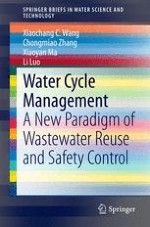This book focuses on environmental engineering, and on wastewater treatment and reuse in particular, which is a vital aspect for countries and regions suffering from water shortages. It introduces a new water cycle management concept for designing water systems that mimic the hydrological cycle, where reclaimed water is produced, stored/regulated, supplied and used in a semi-natural manner so that its self-purification capacity and system efficiency can be maximized. To ensure safe water throughout the cycle, emphasis is placed on the control of ecological and pathogenic risks using a series of quality indices associated with bioassays and molecular biological analyses, as well as risk assessments focusing on protecting the environment and human health. Together with theoretical and technological discussions, a real case of a district water system for maximizing water circulation and reuse by means of a sophisticated water cycle is presented. This book introduces readers to essential new concepts and practices and illustrates the future perspectives offered by a new paradigm for design and safety control in the context of wastewater reuse systems.
